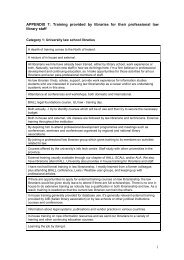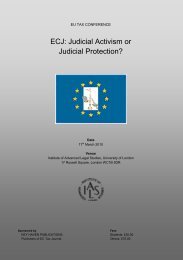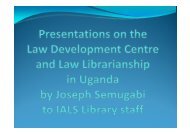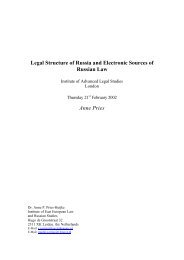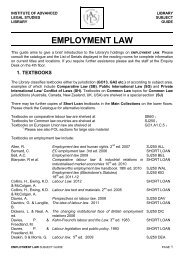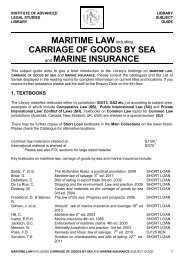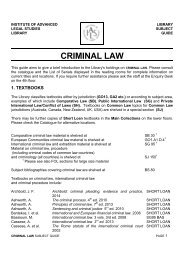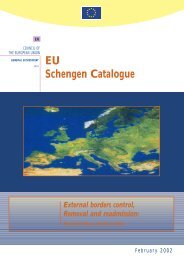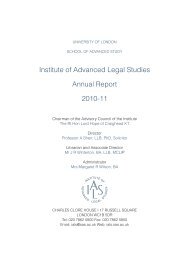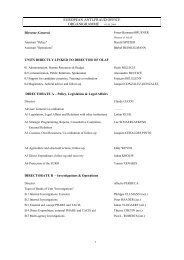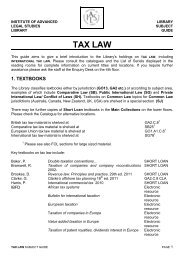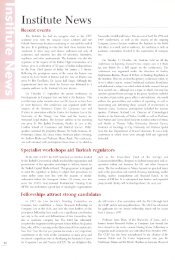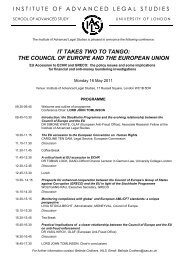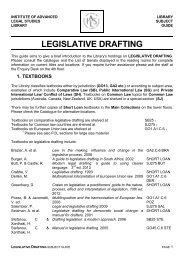a thesis - Institute of Advanced Legal Studies
a thesis - Institute of Advanced Legal Studies
a thesis - Institute of Advanced Legal Studies
Create successful ePaper yourself
Turn your PDF publications into a flip-book with our unique Google optimized e-Paper software.
98 IMPLIED TRUSTS.<br />
beho<strong>of</strong> <strong>of</strong> B.," his wife's sister, and the policy provides that B., her<br />
executors, administrators and assigns shall bo entitled to receive the<br />
policy moneys on A.'s death. A. survives B., retains the policy,<br />
and pays the premiums till his death. B.'s representative is a<br />
trustee <strong>of</strong> the policy moneys for A.'s executor. In re a Policy,<br />
(1902) 1 Ch. 282. < ' •<br />
But the foundation <strong>of</strong> the doctrine is the desire <strong>of</strong> courts <strong>of</strong><br />
equity to give effect to the intention <strong>of</strong> the parties, and there is<br />
therefore no resulting trust if it appears to have been the intention<br />
<strong>of</strong> the purchaser that the transferee should take beneficially.<br />
" It is the established doctrine <strong>of</strong> a court <strong>of</strong> equity that this<br />
resulting trust may be rebutted by circumstances in evidence,"<br />
Chief Baron Eyre said in Dyer v. Dyer. And this doctrine was<br />
extended by the case <strong>of</strong> Foickcs v. Pascoc (1875, L. R. 10 Ch. App.<br />
343), where it was held that in determining whether a trust or a<br />
gift was intended, regard must be had as well to the circumstances<br />
<strong>of</strong> the case as to the evidence adduced by the party who alleges<br />
that he was intended to take beneficially.<br />
Further, the fact that the purchase is made by a father in the<br />
name <strong>of</strong> a child, by a husband in the name <strong>of</strong> a wife, or by any<br />
person in the name <strong>of</strong> another to whom he is in loco parent is, is<br />
prima facie evidence <strong>of</strong> intention to make a gift. Here, according<br />
to Sir G-eorge Jessel, " the presumption <strong>of</strong> gift arises from the<br />
moral obligation to give" (10 Ch. D. 477). This presumption <strong>of</strong><br />
advancement, as it is called, has been applied in the following<br />
cases:—<br />
Illustrations.<br />
1. A. takes bonds in the names <strong>of</strong> his infant grandchildren,<br />
whose father is dead. This is a provision for them, and there is<br />
no presumption <strong>of</strong> a resulting trust. Ebrand v. Dancer (1680),<br />
2 Ch. Ca. 26.<br />
2. A. purchases property and takes the conveyance to himself<br />
and his wife and X. during their lives and the life <strong>of</strong> the survivor.<br />
After A.'s death his wife is not a trustee for A.'s estate. Kingdon<br />
v. Bridges (1688), 2 Vern. 67.<br />
3. A. purchases property in the name <strong>of</strong> his illegitimate son, to<br />
whom he is in loco parentis. This is presumed to be a gift. BecJcford<br />
v. Bedford (1774), L<strong>of</strong>ffc. 490.



